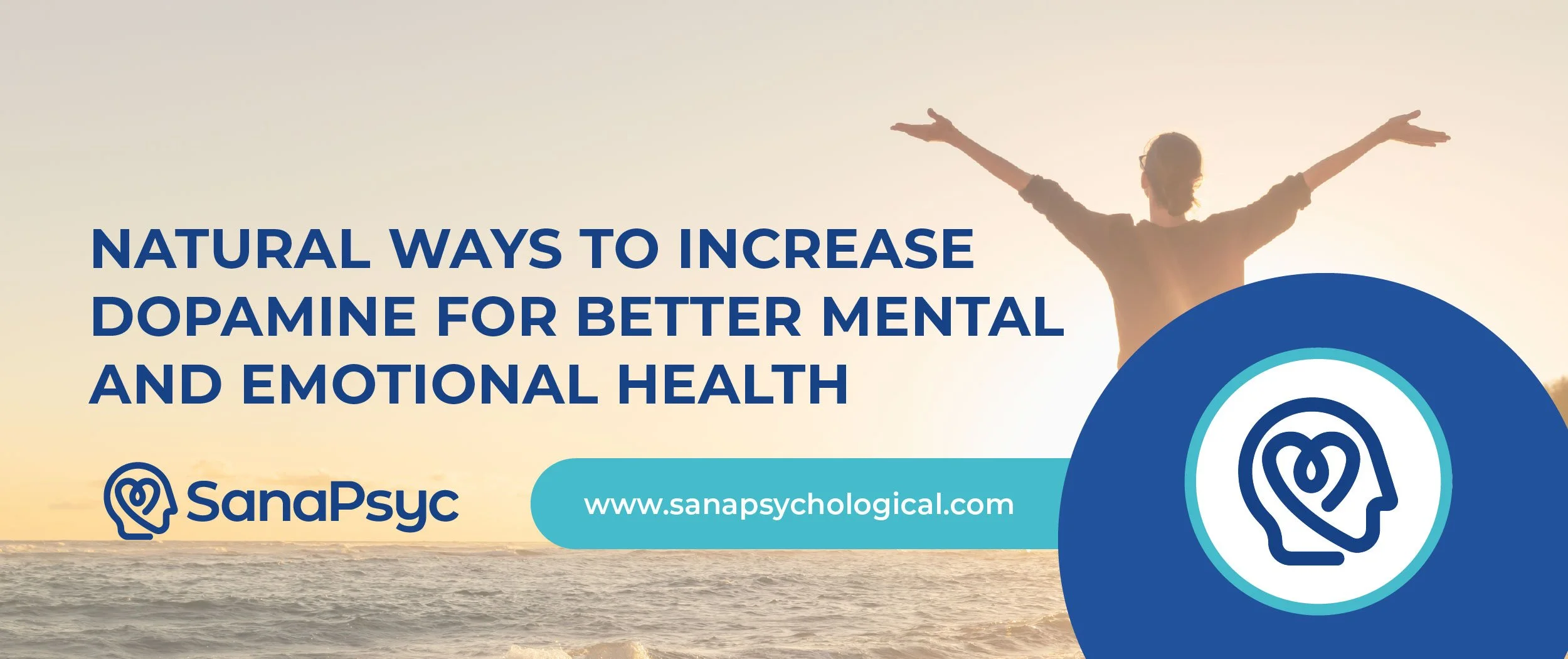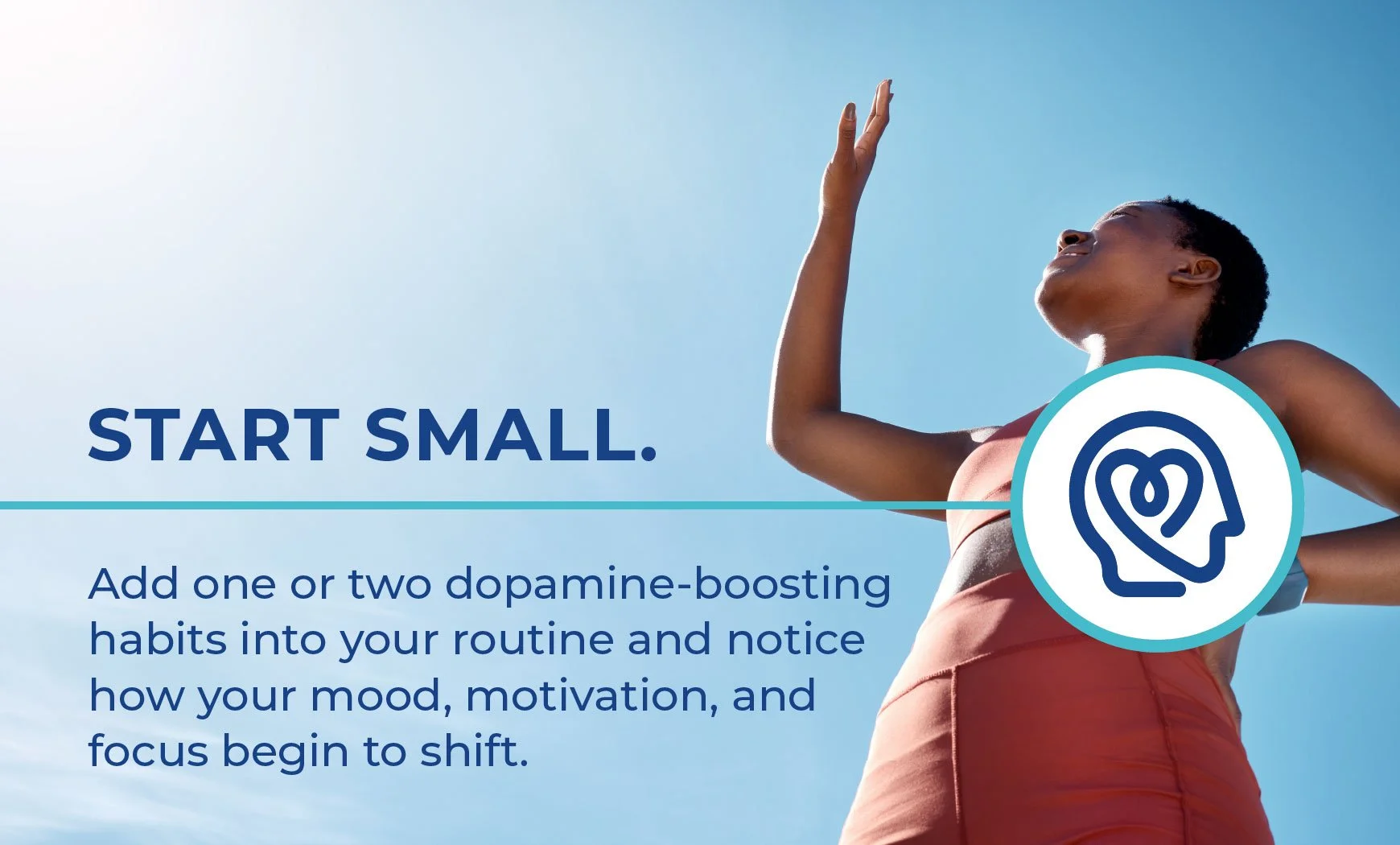Naturally Boosting Dopamine: Suggestions from Depression Counselling Calgary Therapists
Dopamine is often referred to as the brain's “feel-good” chemical—but it’s much more than that. It's a neurotransmitter that plays a crucial role in motivation, focus, pleasure, and even movement. Whether you’re chasing a goal, enjoying a delicious meal, or simply checking a task off your to-do list, dopamine is involved.
Dopamine is impacted by physical as well as mental health conditions and can be more challenging to access in the brain when things like addiction, ADHD, depression or anxiety are active.
Did you know that you can naturally boost dopamine production? The good news is: yes, you can. Let’s explore what dopamine does in the brain and the most effective, natural ways to increase it for better mental and emotional health. Our depression counselling Calgary therapists who work with depression and other mental health conditions everyday weigh in and share their insights.
Dopamine Explained by Our Depression Counselling Calgary Therapists
Dopamine is a chemical messenger (neurotransmitter) produced in several areas of the brain (if you are looking to learn more, these areas of the brain are, most notably, in the substantia nigra and the ventral tegmental area). Dopamine plays a vital role in:
Motivation and Reward: Dopamine gives you the “drive” to pursue goals and feel rewarded when you achieve them.
Pleasure and Mood: It helps regulate feelings of enjoyment, satisfaction, and pleasure.
Focus and Attention: It aids concentration and is often linked with ADHD when levels are imbalanced.
Movement and Coordination: Low dopamine levels are associated with movement disorders such as Parkinson’s disease.
Low dopamine levels can result in fatigue, apathy, mood swings, lack of motivation, depression and anxiety. This is why supporting your system with natural dopamine is important for overall health, according to our depression counselling Calgary therapists.
How to Naturally Boost Dopamine According to Our Depression Counselling Calgary Therapists
You don’t need supplements or medications to support healthy dopamine levels (nor do you need drugs, alcohol, fast food, social media, gambling, or the other sources of quick dopamine we have become so dependent on). Here are science-backed, natural ways to encourage your brain to produce more dopamine, supported by depression counselling Calgary therapists:
1. Exercise and Move Your Body Regularly
Physical activity, especially aerobic exercise, increases dopamine release and stimulates the growth of new dopamine receptors. You know that phenomenon where you don’t want to go move your body but, once you do, you feel great? This is partly due to the benefits of natural dopamine. Thankfully for this to work we are not talking anything too fancy or extravagant: A brisk 20-minute walk can give you a dopamine boost, gentle stretch session, or dance around in your room to fun music. All of these benefit our mind and body. Here are some other joyful movement ideas.
2. Eat Dopamine-Boosting Foods
Certain nutrients are essential for dopamine production, especially the amino acid tyrosine, which is the building block of dopamine.
Foods high in tyrosine include:
Eggs
Dairy (especially cheese)
Fish
Chicken and turkey
Soy products
Bananas
Almonds and avocados
Also include foods rich in vitamins B6, B9 (Folate), and C, iron, and magnesium to support dopamine synthesis. Examples that our depression counselling Calgary therapists were able to identify include: Leafy green vegetables (spinach, broccoli, chard), citrus fruits, beans, legumes, potatoes, red bell peppers, fish, organ meats, tomatoes and kiwi. Trying to incorporate a diverse range of foods in your nutrition is an important way to ensure the various needs of your body are being attended to.
3. Get Quality Sleep
Dopamine levels naturally rise in the morning and fall at night. Poor or irregular sleep disrupts this cycle, reducing dopamine receptor sensitivity.
Try this:
Stick to a consistent sleep schedule
Aim for 7–9 hours of sleep each night
Avoid screens 1–2 hours before bed (we know it’s hard. Our depression counselling Calgary therapists recommend reading, listening to gentle music, gentle stretching or, if you must have screens before bed, try turning down the brightness and seeing if you can add a blue light filter so that your brain is not as triggered to think it’s day and waking time, rather than night time).
For additional sleep tips, check out one of our previous blogs with over 10 suggestions to help you improve your quality of rest.
4. Practice Meditation, Mindfulness, and/or Yoga
Meditation, mindfulness and yoga have been shown to increase dopamine levels, especially practices that involve focus and gratitude. These practices also reduce stress, which can suppress dopamine over time, and have a helpful impact on other neurotransmitters, including serotonin, GABA, and others. Getting into a regular practice of 5-20 minutes/day can help support these positive neurotransmitter changes.
A few resources that our depression counselling Calgary therapists have found helpful are:
Our blog with over 20 suggestions on how to calm down and regulate
Apps like Insight Timer, Headspace or Calm for guided meditation
We encourage you to experiment, explore and find the methods that connect for you. They will all feel weird at first but consistency is key to supporting natural dopamine production and release. This helps with a balanced, regulated mood.
5. Listen to Uplifting Music
Music you love can trigger dopamine release in the brain, similar to other rewarding experiences. Our depression counselling Calgary therapists suggest that you create a playlist of your favorite “feel-good” songs and use it to lift your mood or energize your day.
6. Achieve Small Goals & Congratulate Yourself For Them
Completing tasks—big or small—releases dopamine. This creates a feedback loop that increases motivation and productivity. Giving yourself a pat on the back- whether by verbally telling yourself, “Good job,” checking the task off on a to-do list, or taking a few moments to survey the end result of your accomplishments also help naturally boost dopamine and train our brains to look for these small successes, not just big wins. Our depression counselling Calgary therapists suggest that you break larger goals down into smaller, manageable tasks which helps goals become less overwhelming, easier to accomplish, and easier to pride ourselves for as we take each step along the way.
7. Get Sunlight Exposure
Sunlight helps increase dopamine receptors and boosts vitamin D, which is essential for dopamine synthesis. Our depression counselling Calgary therapists have seen that it is recommended to aim for 15–30 minutes of sunlight exposure per day, preferably in the morning. For those of us living in northern climates, do what you can. Sit by a window, turn your face toward the sun while running from the building to a vehicle on a cold day, consider light therapy and/or vitamin D supplementation. While these strategies may not be ideal or perfect, that’s okay! Supporting health never will be perfect, just do your best to take care of your basic needs and be gently supportive of yourself.
8. Engage in Creative Activities
Painting, writing, playing music, cooking, pottery or any form of self-expression can boost dopamine. These activities also promote a state of “flow,” where dopamine levels naturally rise. Strategies like this come up often in depression counselling to support those who are navigating low mood. These times are often ones where the mind feels quieter, mood feels a bit better, and time passes in a different way.
9. Slow Down Your Pace
We live in a world where everything is instant and fast. Who gets annoyed when their package can’t be delivered the same or next day? Yeah, I know, we’re guilty of that too! Remember when we used to have to wait for things? Even if you don’t remember this, forcing our mindset to be one of slower pacing is helpful. Examples of this from our depression counselling Calgary therapists include: Savouring food, walking a bit slower from place to place, taking a breath before beginning a task, looking outside to pause for a moment. Taking anything slower helps our brain find value and benefit in the everyday rather than looking for the big, the grand, and the exciting.
10. Have Analog Times
Our digital age is quick and dopamine flooding. Getting used to this fast-paced, immediate source of dopamine upsets the natural balance within our brains. Taking time, whether each day or week, to do analog activities is helpful.
This might mean: Reading a book rather than online, watching a full TV show or movie rather than 30 second clips of reels (it’s not totally analog but we’re being realistic here!), preparing a meal with a cookbook or handwritten recipe rather than looking online, writing in a journal or a letter rather than typing, doing a chore or activity that is hands on rather than online. These all support our brains differently than the digital space.
Our depression counselling Calgary therapists notice people have decreased depression and anxiety symptoms when they spend more time offline and more time in life.
Consider a Dopamine Reset: Encouragement from Our Depression Counselling Calgary Therapists
One of our favourite books is ‘Dopamine Nation’ by Dr. Anna Lembke. Her work talks about how dopamine acts in our system and is connected to addictive and compulsive/impulsive behaviours. As a way to help our system, consider the idea of a dopamine reset.
What this means is basically detoxing the system for a period of hours to days/weeks (basically, whatever you can stand) in order to bring our system back closer to baseline. That way, rather than needing 100 units of dopamine to feel anything, maybe your brain will only need 10 units. This means a greater sense of satisfaction, pleasure and joy from daily living rather than needing extreme quantities, behaviours or substances to feel something from.
If you decide to do a dopamine reset, consider:
What behaviour(s) or substances you may need to detox from (common examples include social media scrolling, screentime in general, substances like alcohol, caffeine or sugar, gaming, gambling, or pornography use)
How long are you able to give yourself to detox? Are you going to lessen the total time/day or try and go for multiple days without any use
What you are going to do instead. Alternative activities include body movement, socializing, learning, reading, tasks, creative arts, cooking, writing, etc.
The benefits of doing this and why you’re doing this. Trust us, you’ll want to remember this when your body is resetting and craving quick sources of dopamine!
If you decide to go ahead with a reset, remember that any type of shift in behaviour is helpful for our brains and reward system. It is about progress, not perfection, and can be done anytime, as often as needed.
Final Thoughts From Our Depression Counselling Calgary Therapists
Dopamine is essential for a balanced, motivated, and joyful life—but modern habits can often deplete it, as can mental health conditions and addiction. By making intentional lifestyle changes, you can naturally support your brain’s dopamine production and improve your overall well-being.
Start small. Add one or two dopamine-boosting habits into your routine and notice how your mood, motivation, and focus begin to shift.
Want More Healthy Lifestyle Tips?
If you enjoyed this post, subscribe to our newsletter for regular updates on mental health, self-care, and wellness. Feel free to share your favorite dopamine-boosting activity in the comments!
Sana Psychological is a mental health and addiction recovery practice with skilled clinicians offering support in a number of different areas. We happily support those with depression and mood issues, along with many other areas of mental health. We encourage you to visit our booking site to learn more about our clinicians as well as our free resources for support wherever you are at in your journey.



